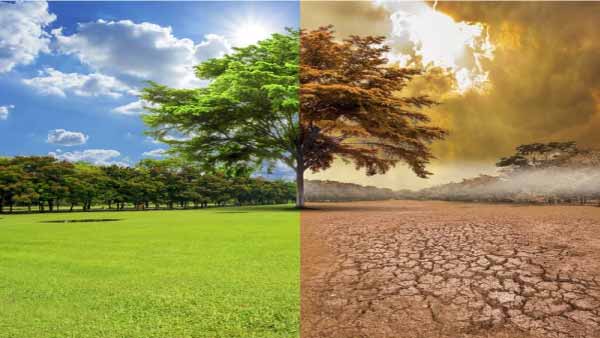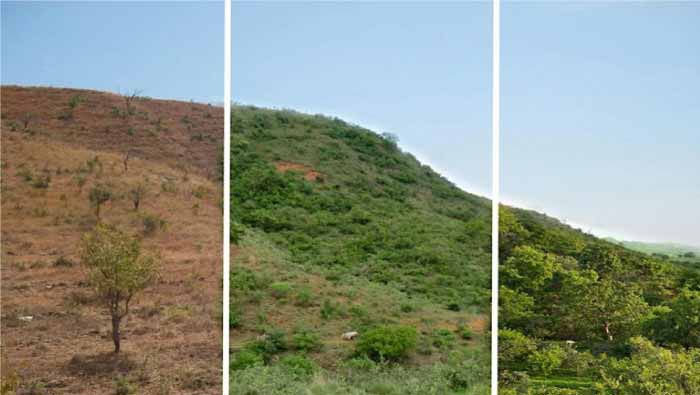Climate change refers to a significant and long-lasting change in global weather patterns as a result of human activity. As the world’s population has grown and industrialization has advanced, we have been emitting large amounts of greenhouse gases into the atmosphere, which is causing an increase in global temperature and other significant climate changes.
The effects of climate change can include an increase in the frequency and severity of extreme weather events, such as hurricanes, droughts, floods and heat waves. There may also be changes in species distribution, declining biodiversity and altered patterns of cultivation and food production.
It is important to take action to reduce our greenhouse gas emissions and adapt to climate changes that are already underway. This can include changes in energy policy, reducing the individual carbon footprint, investing in sustainable technologies, and implementing adaptation measures to help communities prepare for climate changes that are already happening.
Climate change is a complex and multifaceted issue involving many aspects of human life, from energy production and agriculture to public health and infrastructure. Here are some additional details about climate change:
Causes of climate change
The main cause of climate change is the emission of greenhouse gases, which are produced by the burning of fossil fuels, deforestation and other human activities. These gases, such as carbon dioxide, methane and nitrous oxide, trap heat from the sun in the atmosphere, causing an increase in global temperature.
Effects of climate change
Climate change is already having a number of negative effects around the world, including an increase in the frequency and severity of extreme weather events, such as hurricanes, droughts, floods and heat waves. There may also be changes in species distribution, declining biodiversity and altered patterns of cultivation and food production. In addition, climate change can have effects on human health, such as the spread of vector-borne diseases and air pollution.
Climate change mitigation
Climate change mitigation refers to the reduction of greenhouse gas emissions. This can be achieved through the adoption of cleaner and more efficient technologies, such as solar, wind and hydropower, and through the implementation of policies that promote energy efficiency and emissions reduction. In addition, reforestation and forest conservation can help reduce carbon dioxide levels in the atmosphere.
Adaptation to climate change
Climate change adaptation refers to the implementation of measures that help communities prepare for the effects of climate change that are already happening or that are inevitable. This may include building infrastructure more resilient to extreme weather events, promoting sustainable agricultural practices, and investing in adaptive technologies, such as early warning systems for natural disasters.
International agreements on climate change
The international community has agreed on a series of measures to address climate change, including the Paris Agreement, a global agreement signed in 2015 that aims to limit global temperature rise to less than 2 degrees Celsius above pre-industrial levels. The signatory countries of the agreement have committed to take measures to reduce their greenhouse gas emissions and to report regularly on their progress.
The Science of Climate Change
The scientific community has accumulated a wealth of evidence to support the idea that climate change is real and happening. Scientists have measured the rise in global temperature, observed melting glaciers and sea level rise, and conducted studies on the distribution of species and other effects of climate change. These findings are supported by a large number of peer-reviewed studies and analyses.
The impacts of climate change on the economy
Climate change also has impacts on the global economy, including the loss of lives and material goods due to natural disasters and the rising cost of insurance and medical care due to health impacts. It can also have an impact on agricultural production and food security, as changing weather patterns can affect crop productivity. In addition, companies that rely on fossil fuels may face economic challenges as they move toward a cleaner, more sustainable economy.
The responsibility of individuals in climate change
While change is a global problem, individuals also have a role to play in reducing greenhouse gas emissions. People can take steps to reduce their carbon footprint, such as driving less, using less energy at home, eating less meat and dairy, and traveling more sustainably. In addition, they can pressure business and political leaders to take more ambitious action to reduce greenhouse gas emissions and mitigate the effects of climate change.
The need to act now
Since change is already happening and its effects can last for centuries, it is important to take action to address it now. The longer we wait to take action, the harder it will be to reduce our greenhouse gas emissions and adapt to climate changes that are already happening. Solutions are complex and require coordinated global action, but it is crucial to work together to protect our planet and ensure a sustainable future for generations to come.
The causes of climate change
The main cause of change is the emission of greenhouse gases, mainly carbon dioxide, methane and nitrous oxide, produced by the burning of fossil fuels such as oil, gas and coal, as well as by agriculture and deforestation. These gases retain heat in the atmosphere and cause an increase in global temperature, which leads to changes in weather patterns.
The effects of change on biodiversity
Change is also having a significant impact on biodiversity. Changing weather patterns can affect the distribution and survival of species, which can have an impact on ecosystems and food security. In addition, rising global temperatures are causing ocean acidification, which can have an impact on marine life.
Efforts to address change
The international community has taken steps to address change, including the 2015 Paris Agreement, in which countries pledged to limit global temperature rise to less than 2 degrees Celsius above pre-industrial levels. In addition, many countries are investing in clean and renewable technologies, such as wind and solar power, and are adopting policies to reduce greenhouse gas emissions.
The challenges of addressing change
Despite international efforts to address change, there are significant challenges that need to be addressed. Some countries still rely heavily on fossil fuels for their economies, making it difficult to transition to a cleaner and more sustainable economy. In addition, action to address change can be costly and there may be political and cultural resistance to the necessary changes.
The role of technology in the fight against change
Technology can also play an important role in the fight against change. Renewable energy, such as wind and solar power, is becoming increasingly economical and efficient, making it more attractive to businesses and consumers. In addition, carbon capture and storage technology can help reduce greenhouse gas emissions from industries that still rely on fossil fuels.


